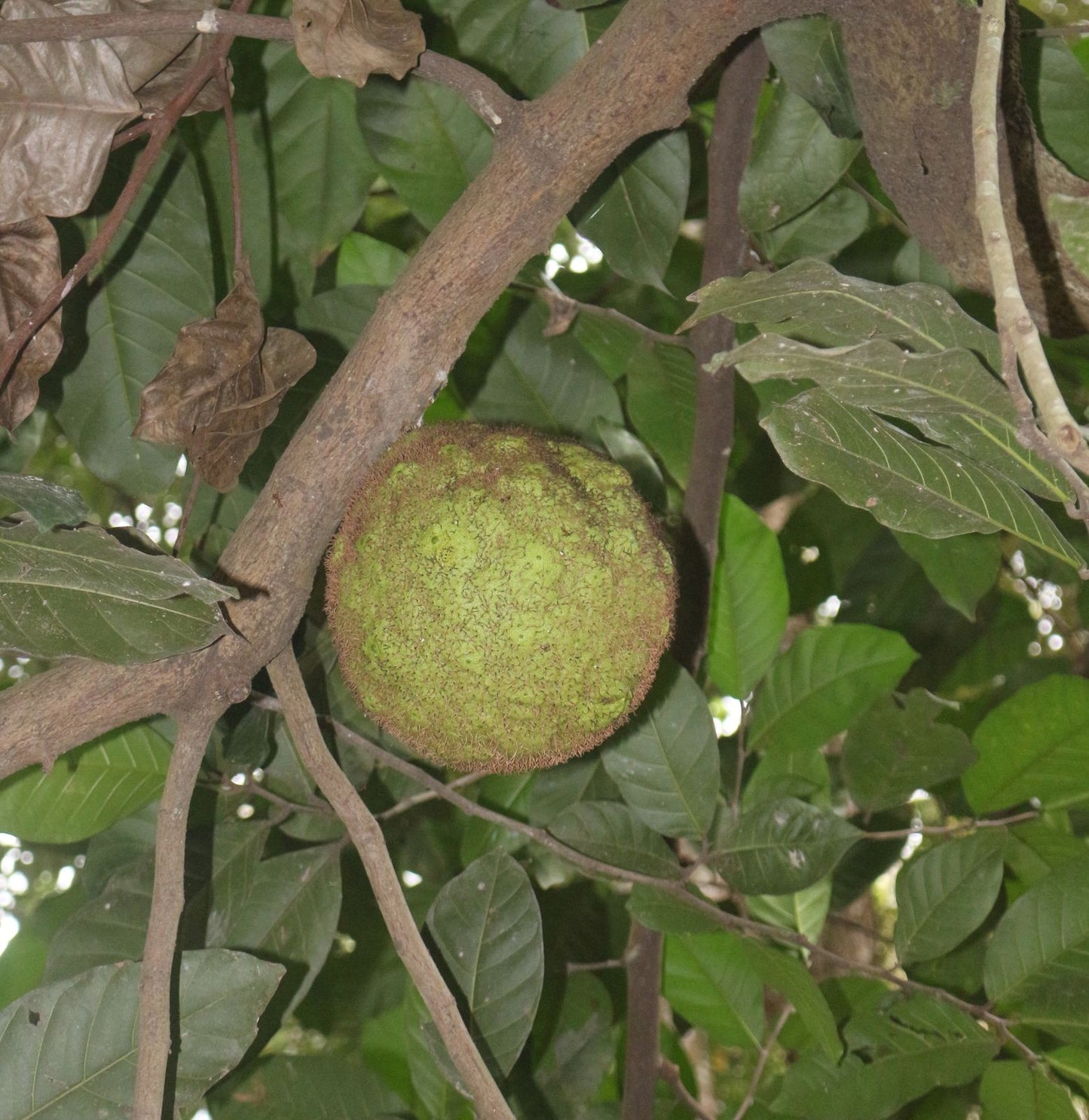Love it? Add to your wishlist
Your favorites, all in one place. Shop quickly and easily with the wishlist feature!
[message]
[title]
[message]


Veliyath Gardens
Couldn't load pickup availability
African Breadnut: The Nutritious Heritage Tree of the Tropics
(Botanical Name: Treculia Africana | Common Name: African Breadfruit, Ukwa)
Treculia africana, more commonly known as African Breadfruit or Ukwa in Nigeria, is one of the most extraordinary fruit-bearing trees native to tropical Africa. This stately evergreen tree is revered not only for its massive and unique fruits but also for its deep cultural roots, versatility, and nutritional value. A member of the Moraceae family, Treculia africana thrives across various regions of Sub-Saharan Africa and is now being introduced to selected tropical gardens worldwide, including at Veliyath Gardens, where rare species like this are conserved and made accessible to fruit enthusiasts.
Growth Habit: A large, tropical evergreen tree that grows tall with a fluted trunk and a dense, spreading crown, making it a significant presence in any landscape.
Bark and Latex: The bark is smooth and dark-gray, exuding a rust-colored latex when incised, a characteristic useful in traditional applications.
Leaves: Exceptionally large, simple, and arranged alternately, adding to the tree’s ornamental appeal.
Fruit: Produces massive round fruits, sometimes weighing over 5 kg, filled with hundreds of orange or yellowish seeds embedded in a soft, spongy pulp.
Cultivation Method: Propagated through seeds or stem cuttings, both methods offering reliable growth when nurtured properly.
Nigeria: Known as Ukwa in Igbo communities, where it is considered a delicacy and a festive food.
Cameroon: Sometimes called Akom, particularly used in the western regions.
Ghana: Referred to as Kyenkyen, traditionally used in both culinary and medicinal applications.
These names reflect the deep cultural association of the tree across West and Central Africa.
The seeds, which form the edible part of the fruit, have a nutty, mildly sweet, and slightly earthy flavor, often compared to that of peanuts or chestnuts.
Culinary Uses:
Seeds are roasted or boiled and eaten as snacks or desserts.
Ground into flour or meal to make soups, porridge, and bread.
Used as an ingredient in traditional African dishes, especially in festive events and community meals.
The seeds also yield edible oil, which is locally extracted and used in cooking.
Its flavor makes it highly adaptable in both sweet and savory dishes, a perfect addition to any innovative tropical kitchen.
Treculia africana is more than just a culinary delight—it’s a nutritional powerhouse with exceptional medicinal value:
Rich in Macronutrients:
High in carbohydrates and dietary fiber, making it an excellent source of energy.
Contains a significant amount of plant-based protein, with a higher biological value than soybeans—ideal for vegetarians and vegans.
Loaded with Micronutrients:
Good levels of potassium, iron, calcium, and Vitamin C support immunity and bone health.
Contains Vitamin B3 (Niacin), beneficial for skin health and metabolic function.
Medicinal Uses (Traditional):
Used in folk medicine as a laxative, anthelmintic, and febrifuge.
Applied topically or ingested to treat coughs, leprosy, and inflammatory swellings.
The bark and latex are sometimes used in indigenous healing practices.
Growing Period: The tree begins to flower and fruit within 3 to 4 years under favorable tropical conditions.
Soil Preference: Grows well in moist, well-drained soils, preferably enriched with organic matter.
Sunlight: Requires full sunlight to partial shade.
Maintenance Level: Moderate, with regular watering during dry seasons and occasional pruning to manage canopy spread.
Pest and Disease Resistance: Generally hardy, with minimal susceptibility to pests when grown in its native or similar climates.
This makes it an ideal candidate for a fruit plant garden that seeks resilience, productivity, and a meaningful story.
The seeds can be sun-dried and stored for long periods, ground into flour, or preserved in oil.
Roasted or boiled seeds are sometimes sealed in clay pots or traditional containers, a practice common in African villages.
In many cultures, breadfruit-based dishes are served during celebrations, weddings, and community feasts, symbolizing abundance and unity.
Its versatility in recipes and long shelf life when preserved properly make it a valuable addition to any household pantry or commercial kitchen.
If you're looking for a plant that blends cultural heritage, nutritional richness, and culinary diversity, African Breadfruit (Treculia africana) is a must-have.
Whether roasted for snacks, cooked in soups, or ground into flour, its seeds add a touch of tradition, flavor, and wellness to everyday life.
The tree's majestic appearance and easy cultivation make it ideal not just for fruit yield but also as an ornamental and shade tree in gardens or farms.
At Veliyath Gardens, we recognize the immense value of rare and traditional tropical fruit trees like Treculia africana. Our commitment to preserving these botanical treasures extends to offering them to gardeners, health-conscious individuals, and cultural enthusiasts alike. By adding African Breadfruit to your garden, you embrace not only a plant but a legacy of nutrition, sustainability, and history.
Explore the African Breadfruit Tree at Veliyath Gardens — a living testament to tropical heritage, nourishment, and natural wonder. Let this rare tree enrich your garden and your table.
Growing Period: The tree begins to flower and fruit within 3 to 4 years under favorable tropical conditions.
Soil Preference: Grows well in moist, well-drained soils, preferably enriched with organic matter.
Sunlight: Requires full sunlight to partial shade.
Maintenance Level: Moderate, with regular watering during dry seasons and occasional pruning to manage canopy spread.
Rich in Macronutrients:
High in carbohydrates and dietary fiber, making it an excellent source of energy.
Contains a significant amount of plant-based protein, with a higher biological value than soybeans—ideal for vegetarians and vegans.
Loaded with Micronutrients:
Good levels of potassium, iron, calcium, and Vitamin C support immunity and bone health.
Contains Vitamin B3 (Niacin), beneficial for skin health and metabolic function.
If you're looking for a plant that blends cultural heritage, nutritional richness, and culinary diversity, African Breadfruit (Treculia africana) is a must-have.
Whether roasted for snacks, cooked in soups, or ground into flour, its seeds add a touch of tradition, flavor, and wellness to everyday life.



